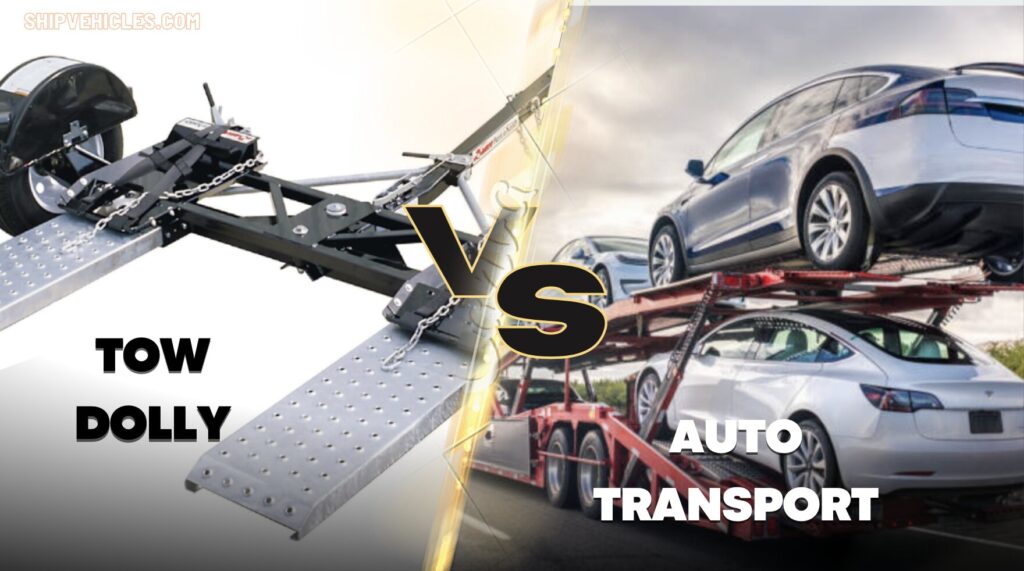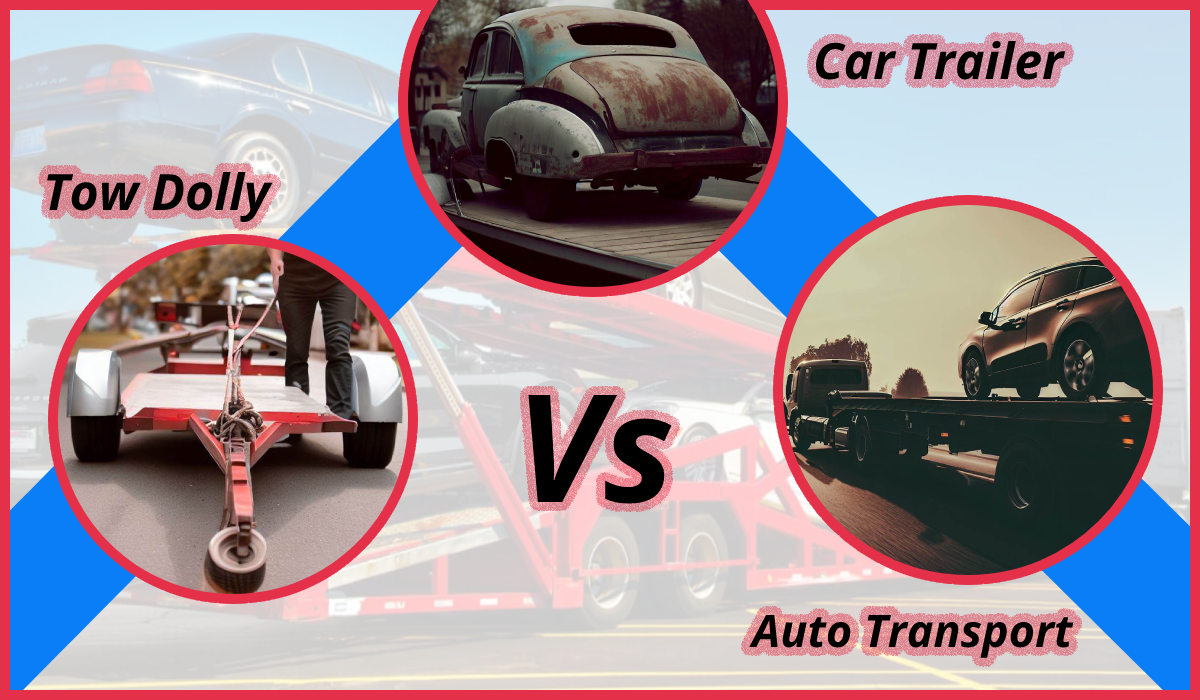When it comes to transporting your vehicle, convenience and safety are paramount. That’s why the age-old question of whether to opt for a tow dolly or a car carrier can leave vehicle owners scratching their heads. Both options offer unique advantages, but understanding which one is better suited for your needs requires careful consideration. In this article, we will explore the pros and cons of tow dollies and car carriers, helping you make an informed decision that ensures a smooth and worry-free journey for your vehicle.

This image is property of www.shipvehicles.com.
Cost
Tow Dolly Cost
When considering whether to use a tow dolly or a car carrier, one of the important factors to consider is the cost. Tow dollies tend to be the more budget-friendly option compared to car carriers. Tow dollies are relatively cheaper to purchase and rent, making them an ideal choice for those who are looking to save some money.
Car Carrier Cost
On the other hand, car carriers generally come with a higher price tag compared to tow dollies. Car carriers are larger and more complex pieces of equipment, requiring more materials and resources for their construction. This additional cost is often reflected in the price for purchasing or renting a car carrier.
Ease of Use
Tow Dolly Ease of Use
When it comes to ease of use, tow dollies have their advantages. They tend to be simpler in design and operation compared to car carriers. Tow dollies are generally easier to attach to the towing vehicle and loading the towed vehicle onto the dolly is a straightforward process. Additionally, maneuvering with a tow dolly is often easier due to its smaller size and lighter weight.
Car Carrier Ease of Use
While car carriers may require a bit more effort and knowledge to operate effectively, they can still be relatively easy to use with proper training and experience. Car carriers typically have more moving parts and features compared to tow dollies, but many models come with convenient features such as hydraulic systems for loading and unloading the towed vehicle. While it may take more time to become familiar with a car carrier, the added convenience and versatility they offer can outweigh the initial learning curve.

This image is property of www.autostartransport.com.
Weight Capacity
Tow Dolly Weight Capacity
One of the crucial factors to consider when deciding between a tow dolly and a car carrier is the weight capacity they can handle. Tow dollies generally have lower weight capacities compared to car carriers. The weight capacity of a tow dolly typically ranges from around 3,000 to 5,000 pounds. This makes tow dollies suitable for smaller to mid-sized vehicles, such as sedans, compact SUVs, and motorcycles. If you own or frequently tow heavier vehicles, a tow dolly may not be the best choice.
Car Carrier Weight Capacity
Car carriers, on the other hand, have significantly higher weight capacities compared to tow dollies. The weight capacity of a car carrier can range from 5,000 pounds to well over 10,000 pounds, depending on the model. This makes car carriers suitable for larger vehicles, including trucks, vans, and larger SUVs. If you need to tow heavy-duty vehicles or have a more substantial load, a car carrier can provide the necessary capacity.
Towing Stability
Tow Dolly Towing Stability
Towing stability is a critical factor that should not be overlooked when choosing between a tow dolly and a car carrier. Tow dollies, by design, have a single axle that supports the front end of the towed vehicle. While this setup can provide adequate stability for shorter trips and lighter loads, it may not be as stable as a car carrier for longer journeys or in adverse weather conditions.
Car Carrier Towing Stability
Car carriers, on the other hand, offer enhanced towing stability compared to tow dollies. With the towed vehicle fully supported on the car carrier, stability is improved, especially during long-distance towing or when encountering challenging road conditions. The additional support and weight distribution provided by the car carrier’s dual axles contribute to a smoother towing experience.

This image is property of i0.wp.com.
Compatibility with Vehicles
Tow Dolly Compatibility
When it comes to compatibility with different vehicles, tow dollies have certain limitations. Tow dollies are generally designed to accommodate front-wheel drive vehicles. The front wheels of the towed vehicle are secured onto the dolly while the rear wheels remain on the ground. This means that vehicles with rear-wheel drive or all-wheel drive may not be suitable for towing with a tow dolly.
Car Carrier Compatibility
Car carriers, on the other hand, offer more versatility and compatibility with various types of vehicles. Car carriers can typically accommodate front-wheel drive, rear-wheel drive, and all-wheel drive vehicles as the entire towed vehicle is loaded onto the carrier. This makes car carriers a more flexible option, especially for those who own different types of vehicles or plan to tow vehicles with different drivetrains.
Wear and Tear on Vehicles
Tow Dolly Wear and Tear
Another important aspect to consider is the potential wear and tear on both the towing and towed vehicles. When using a tow dolly, the front wheels of the towed vehicle are secured onto the dolly, while the rear wheels remain in contact with the road surface. This setup can subject the towed vehicle’s rear tires to increased wear and tear, especially during long-distance towing. Additionally, the increased stress on the front wheels of the towed vehicle can result in additional strain on the suspension and steering components.
Car Carrier Wear and Tear
Car carriers, on the other hand, distribute the weight of the entire towed vehicle evenly across the carrier’s platform. This can help minimize wear and tear on the towed vehicle, as all four wheels are off the ground and not in direct contact with the road surface. Although there may still be some additional wear on the towed vehicle’s tires due to towing, it is generally less significant compared to a tow dolly setup. Carriers also distribute the weight more evenly on the towing vehicle, resulting in reduced strain on the suspension and drivetrain components.

This image is property of movewheels.com.
Storage Requirements
Tow Dolly Storage Requirements
Considering the storage requirements is essential, especially for those who may have limited space available. Tow dollies are typically smaller and more compact compared to car carriers, making them a more space-efficient option. Tow dollies can often be folded or disassembled for storage, allowing them to fit into smaller areas, such as garages, sheds, or even the trunk of a vehicle.
Car Carrier Storage Requirements
Car carriers, due to their larger size and complexity, generally require more space for storage. Carriers are not as easily collapsible or disassemblable as tow dollies, and therefore, need dedicated storage space when not in use. This may necessitate having a designated parking area or a larger storage facility to house the car carrier.
Maneuverability
Tow Dolly Maneuverability
Maneuverability is an important consideration, particularly when navigating through tight spaces or congested areas. Tow dollies offer better maneuverability compared to car carriers. The compact size and weight of tow dollies make them easier to maneuver, whether it be while parking, reversing, or making sharp turns. This can be advantageous, especially when towing in urban areas or on narrow roads.
Car Carrier Maneuverability
While car carriers may not be as maneuverable as tow dollies, they still offer a reasonable level of maneuverability considering their size. Carriers are designed to be towed behind larger vehicles, such as trucks or SUVs, which are generally more capable of maneuvering in various situations. However, it is important to consider the additional length and width of a car carrier when planning routes or maneuvering in tight spaces.

This image is property of i.ytimg.com.
Safety Considerations
Tow Dolly Safety Considerations
Safety is paramount when it comes to towing vehicles, and tow dollies have their own set of safety considerations. It is crucial to ensure that the front wheels of the towed vehicle are securely fastened to the dolly and that all safety chains and straps are properly attached. Additionally, the increased strain on the front wheels of the towed vehicle can affect its handling, so caution should be exercised while driving, especially during turns and at higher speeds.
Car Carrier Safety Considerations
Car carriers also require attention to safety precautions. The entire towed vehicle must be securely loaded and fastened onto the carrier to prevent shifting or detachment while on the road. It is essential to ensure that the carrier’s ramps, straps, and other securing mechanisms are in good working condition and properly utilized. Adequate training and adherence to safety guidelines are crucial to ensure a safe and incident-free towing experience.
Legal Requirements
Tow Dolly Legal Requirements
Before choosing between a tow dolly and a car carrier, it is important to familiarize yourself with the legal requirements governing towing in your jurisdiction. Tow dollies may have specific regulations regarding their use, including weight limits, lighting requirements, and licensing restrictions. It is essential to comply with these regulations to ensure legal and safe towing operations.
Car Carrier Legal Requirements
Similarly, car carriers may also have specific legal requirements that must be adhered to. These requirements can vary depending on the jurisdiction and may include regulations pertaining to weight limits, lighting, reflectors, license plates, and permits. It is important to consult local transportation authorities or regulatory bodies to ensure compliance with all applicable laws and regulations when using a car carrier.
In conclusion, both tow dollies and car carriers have their own set of advantages and considerations. The choice between the two will depend on various factors, including cost, ease of use, weight capacity, towing stability, compatibility with vehicles, wear and tear, storage requirements, maneuverability, safety considerations, and legal requirements. By carefully considering these factors and assessing your specific towing needs, you can make an informed decision on whether a tow dolly or car carrier is better suited for your particular situation.
